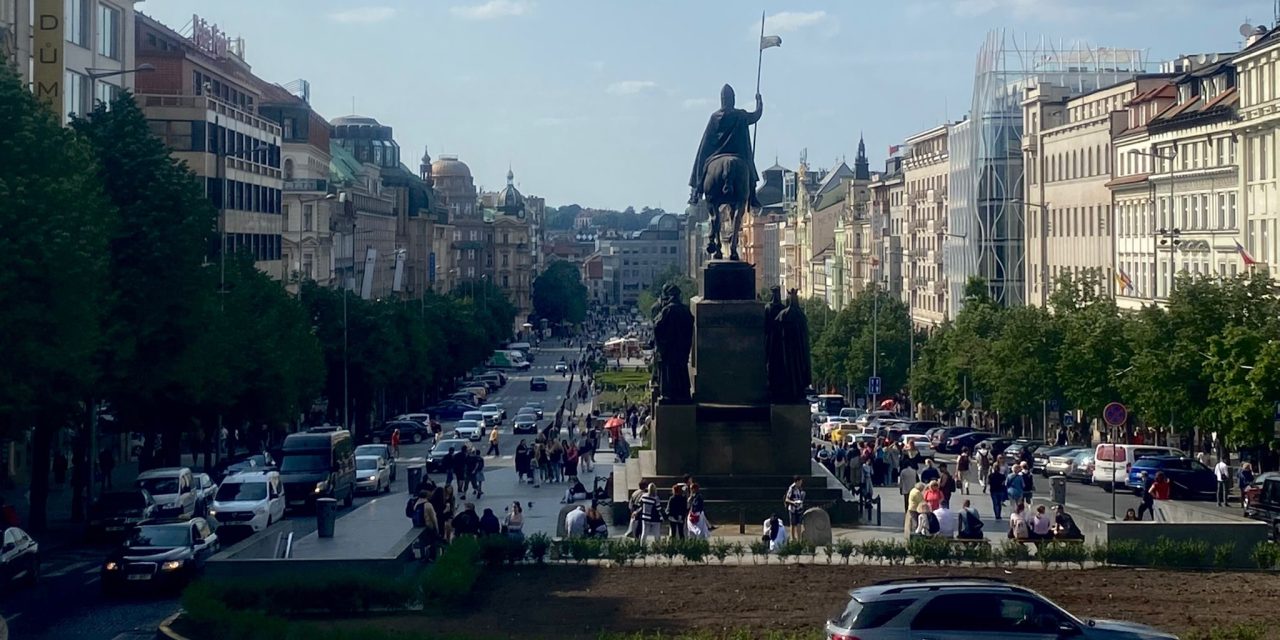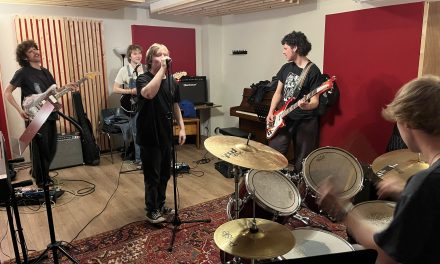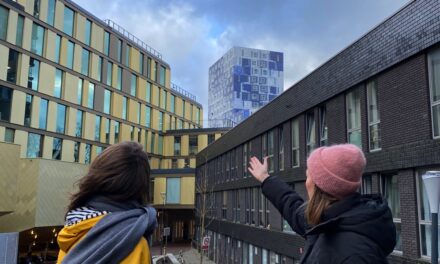*prostitute is a word used in this article as a legal term. A sex worker is the preferred term by the sex worker community and is used where possible in this piece.
Prague is one of Europe’s biggest sex tourism destinations. The city’s low prices for sexual services and cheap beer have captured over half a million stag visitors every year. The volume of tourism to sex clubs has caused some commotion, leaving sex workers feeling mistreated by such visitors.
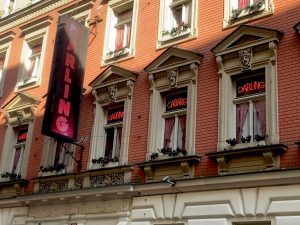
Sex club located at Ve Smekach, where most sex clubs operate.
Sweat dripped off nearly every tourist’s face as the sun beamed down the old town square in mid-June. By Jan Hus’s monument, a loud commotion caught the attention of every bypasser that was glued to their phone or entranced by Prague’s old architecture, the most captivating of it all was a drunk British man dressed in a bridesman costume being nagged on by his friends (mid-twenties) singing, lying on the floor and hugging any unfortunate person who he came in contact with. Of course, people around him recorded and laughed along with his foolishness. Seeing a bachelor party bunch explore the city was nothing out of the ordinary. Nor was it to explore the other side the city has to offer these types of tourists – its sex industry. This business has been around for over two thousand years, offering its relatively low prices for sexual services and cheap alcohol.

Jan Hus Monument
Sex tourism is most notable in Prague and is the most profitable area for its economy. The cities enticing sex industry is a hot spot for over half a million stag visitors ( A stag is what the British call a bachelor party), primarily British, every year, according to its tourist board. According to sociological research by Rozkoš bez Rizika, ten to thirteen thousand people are engaged in the sex business in the Czech Republic (CZ). If someone leaves the business, they are quickly replaced by another.
The consequences of the large volume of stags visiting the city’s nightlife over the past few years have led to the mistreatment of sex workers in Prague.

old town square
Loopholes
Erotic establishments in the Czech Republic are in a legal grey zone. Selling sex is not illegal, but third parties such as pimps profiting from a “prostitute” [legal term] for their gain is a criminal offence.
European registered lawyer (CZ) and United Nations Permanent Representative Charlie Lamento explains that there is cracks within the country’s legal framework that allows an advantage for the criminal involved in the sex business: This can pose difficulty for the prosecutor when trying to convict the accused of sex trafficking and forced prostitution.
A defence often made is that the business between the sex worker and her client is dealt with within the room and has no outside influence. Lamento added that he is “bothered” that the age for consensual sex in the country is 15. If a 15-year-old is caught working in a brothel, the same argument can be made that they did not know the circumstances.
“These are contradictory laws that weaken the process and the reason we are losing the battle today,” he stated.

Tourists gather around Wenceslas Square. At night the main spot for sex workers to pick up clients.
Lamento stated that rather than the country adopting the Nordic model that is currently in force in seven jurisdictions, which criminalizes the user who purchases sex work and grants the right for sex workers to sell their bodies, “we need to criminalize prostitution..” he added that the sex purchase ban creates further challenges for prosecutors when trying to catch the trafficker.
“What frustrates me is that a former prosecutor like me is that these laws don’t help us prosecute traffickers. The laws point fingers at the user, yes, they have more responsibility, but when I was in Norway, I made the argument; you give a license to open a grocery store, but you prosecute the people that go in there and buy products. That doesn’t make sense to me,” he said.
When discussing human trafficking victims, Lamento said that many people assume it is a sex worker who fell into trouble but corrects that human trafficking victims are forced and never want to do this type of work.
“That’s why I get offended when groups try to put consensual prostitutes in the same group as human trafficking victims because they are not,” he said.
“The money involved in this industry is so unbelievably large. It’s worth the risk to make millions of dollars. They might get four to five years in prison, even for a bad case. It’s a joke. It offends me that it is this way. It should offend others that it is this way,” he said.
Over time human trafficking has become a more significant challenge for prosecutors as “criminals are getting more sophisticated in how they are doing it”. Victims that are easily exploitable include Ukrainians and migrants. According to the lawyer, “They are desperate to make money… there’s a lot of exploitable victims, that’s not the problem,” he said.
“If you look at the small number of cases compared to the huge number of victims supposedly involved. That’s pretty sad,” he added.
In 2005 the government proposed to legalize sex work and create a registration system, but it failed to be approved by the parliament. A source said that politicians don’t often push agendas regarding sex work publically as it’s a given that it won’t earn them a favour from the public.

Speaking on the topic, Lamento suggested a better legal framework would open doors for prosecutors to bash down on these criminals, “worst-case scenario is no law,” he said.
The commotion
“Prague is known as a sex tourism destination in the UK. Nobody enjoys having that image of the Czech Republic,” states Yael Schoultz, director of the anti-human trafficking group L’Chaim.
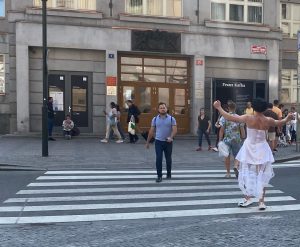
A man dressed in a bride costume.
Her group frequently visit women working in brothels within Prague and Brno, providing them with care and support, and in the worst case, an opt-out for women subject to human trafficking. She believes behaviour by tourists in the brothels does more harm than good for the sex workers.
“It is creating a big problem, but [also] opportunity for the sex workers because they do want customers. On the contrary, I think it is bad for stag parties to come it’s not good for them when the customers are misbehaving and mistreating them,” she said.
Schoultz says that Many tourists visiting the brothels are drunk on arrival and touch the workers without negotiating payment beforehand. “A lot of the stag party men will objectify the women,” she further explained how tourists will pass “horrible” comments to the women, which makes the workers feel “disrespected” in their place of work.

Sex club located at Wenceslas Square.
When the women are alone with a client, there is a panic button the worker can press if they encounter a violent customer. Security is also provided in the brothel, but in cases where the police may need to get involved, Schoultz feels the police do not care for voilence against the sex workers.

She recounts a time when a Romanian sex worker shared her experience dealing with corrupt police. Money had been placed on the bedside from a previous client, and when the next client entered the room, he availed of her service, refused to pay and took the money lying next to the bed. To get her money back, the sex worker took the client’s cell phone and said she would only give it back if he returned her money.
The client became aggressive, so the sex worker ran to hide in one of the Nigerian worker’s rooms behind the curtain. The man had called the police on her complaining that his phone had been stolen. The police then accompanied the man to retrieve his phone, but they could not find the sex worker and left. Later in the evening, a policeman returned to the brothel, found the sex worker and asked her for a bribe to stop him from reporting her for taking the phone.
The sex worker was lost out of money from both customers and police and was out of work for a week after being beaten by the client.
According to Schoultz, the nationalities of women working in the tourist brothels in Prague are mainly Czech and Slovak; the other half of the women are from Romania, Nigeria and Poland. More foreign women are in the brothels in the Czech Republic city of Brno.
Speaking about women within the brothels who are coerced or forced to sell sex, Schoultz said that the women usually pass the money onto someone else, and this does not happen within the brothel to stay hidden from the law. In cases of sex trafficking, the money is being wired or physically sent to another country, which is hard to prove where its origin came from.
“Nigerian girls send the money through Western Union, and it is challenging to prove that it is trafficking money”.

Zdeňka Pecharová, a coordinator of the Czech Republic’s Association for the Protection of Women, an NGO that looks to eliminate socially motivated prostitution in the country, has said the organization has crisis plans made in case the economic situation in the Czech Republic worsens to the extent that it would not be possible to make a living from “prostitution”.
“The government of the Czech Republic also helped us with these crisis plans. When we thought about why the government willingly helped us with this, we came to the opinion that it is paradoxically one of the advantages of the socialist past. Our society is still so egalitarian that it can be said that the government would not help some groups, at least by creating crisis plans if asked. Even if they are sex workers,” she said.
On the criminalization of sex work, Pecharová stated, “90% of socially motivated prostitution prevails, especially among single mothers, women in debt, women who are otherwise disadvantaged on the labour market, and partly also among women who have left a children’s home. If we were to persecute sex workers or their customers, in our circumstances, it would mean taking away these women’s last means of earning, which we don’t want.
“If criminalization were ever to be on the agenda, we need to minimize socially motivated prostitution in the Czech Republic,” she concluded.
Cultural scenario
After the pandemic, a large part of the sex business moved to the online environment leaving the street scene no longer dominant. Pavel Ubrankowicz, a spokesperson for Rozkoš bez Rizika, an NGO based in the Czech Republic which provides health care to sex workers, said because street prostitution is no longer in the public eye, it is more tolerated in the country.
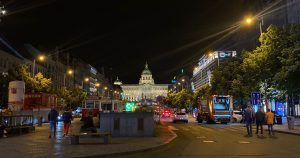
Wenceslas Square at night.

Charles Bridge.
Czech Republic’s political past has been quite socialist, causing the country to be an egalitarian state. Despite this, the government is still conservative in its values. Access to pay for sexual services differs between regions and towns. A decree in some towns of the country has also banned street prostitution.
“What is tolerated in Prague, for example, is punished quite harshly in other smaller towns. The public’s attitude is neutral. It is ignored,” says Ubrankowicz.
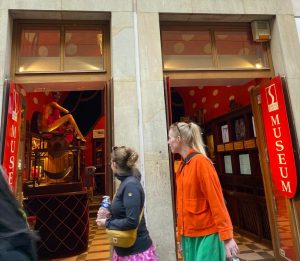
The sex machine museum is in the old town square, a popular tourist spot.
Rozkoš bez Rizika currently cooperates with 11 official clubs in Prague.
Ubrankowicz noted an increase in private households being rented out by several sex workers because the sex worker will take all their earnings instead of working in the club, where half of their profits are given to the club. The NGO registers several dozen private households being rented in Prague alone.
“I am afraid that the political situation in the Czech Republic is not very favourable to [legalization of sex work], and this situation will remain unchanged for many years, perhaps decades,” said Ubrankowicz. He stated that rather than criminalizing this type of livelihood. The government should give the profession a legal framework with rights for the sex worker and obligations.

No clear legal framework for sex work leaves many individuals within the country vulnerable to exploitation and mistreatment by tourists and the system alike. Such a move by the government seems unlikely for the unforeseen future.
*Updated 21 June 2023

